9 Methods of Removing Hard Water Buildup in your Dishwasher
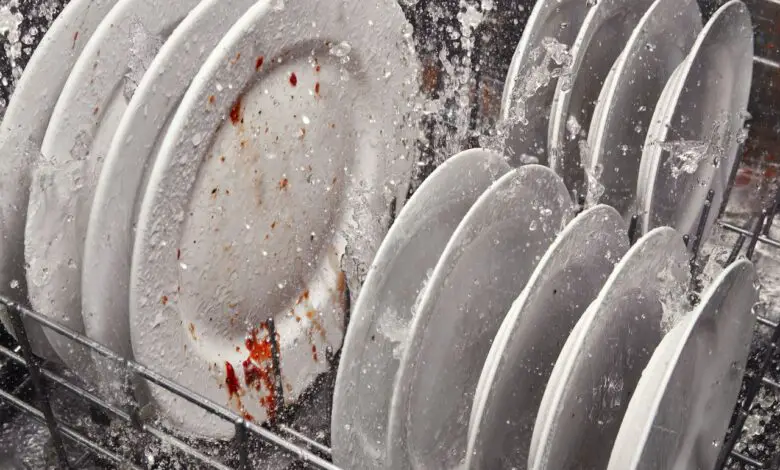
How do you remove hard water from a dishwasher? Water softeners in Arizona are a godsend because the hardness of the water in the state ranges between 13 and 17 gpg (grain per gallon), which is incredibly high. You can understand why so many people want to know how to remove hard water buildup in dishwashers.
Fortunately, such individuals have a variety of solutions at their disposal. But, unfortunately, most of them are surprisingly cost-effective.
What Makes Water Hard?
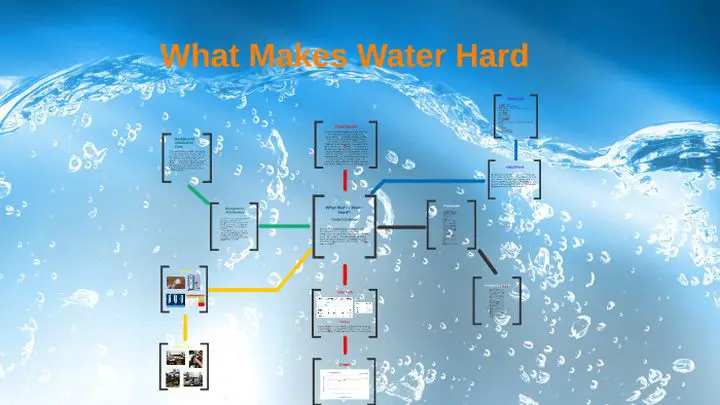
Water has minerals like calcium and iron. Water gets these minerals from rocks and soil as it traverses underground pathways. Sometimes, the mineral content is so high that it affects dishwashers and dishes. However, hard water is not dangerous to human health. Even when the mineral deposits are high, humans can drink hard water without suffering significant side effects.
What Does Hard Water Buildup Do In A Dishwasher?
Hard Water is harmless to humans, but it can wreak havoc on your appliances. Consider the following:
1). Dish Stains
Are your dishes cloudy? Have they developed white spots? Then your water is hard. Before you panic, note that the plates are still clean. The dishwasher did its job. But it also stained the dishes. With some effort, you can remove the chalky residue, especially if you have hard water detergent. But repeated exposure to hard water can permanently stain your cups and plates.
2). Dishwasher Stains
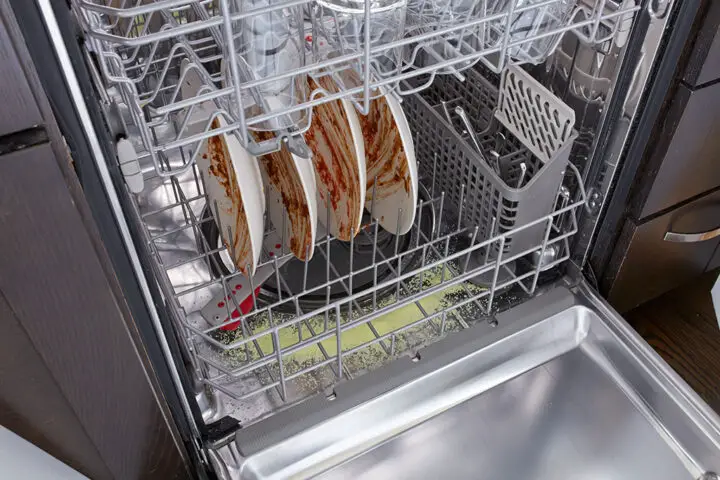
If hard water can stain your dishes, don’t be so surprised if it does the same thing to the dishwasher. The interior will develop unsightly scales. However, don’t dismiss this coating as a mere inconvenience. Hard water can clog the dishwasher’s internal components.
3). Efficiency
If the coating persists, it will corrode the dishwasher’s sensitive components. At some point, the efficiency of the appliance will suffer. It won’t clean your dishes as effectively as you remember. You can repair a dishwasher with clogged and corroded components, but only if those corroded components haven’t fallen off. The key is to respond quickly before the dishwasher suffers irreversible harm.
4). Rust
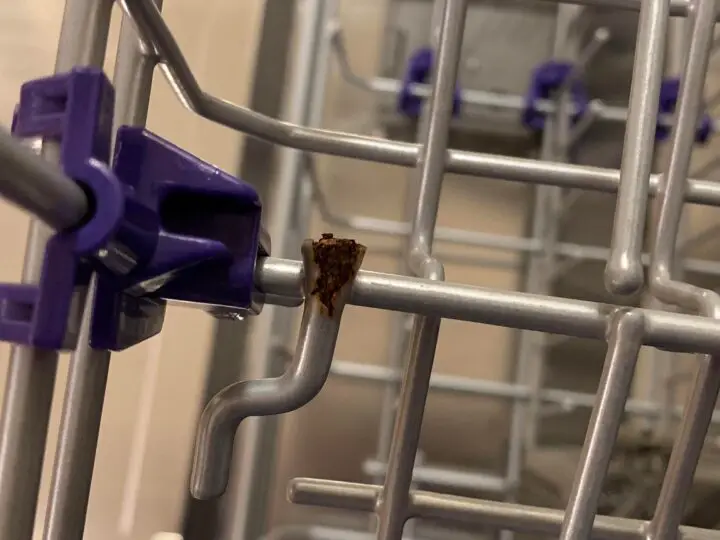
Hard water has a lot of salt, which is a problem because dishwashers have metal sections and, unfortunately, metals hate salt. Exposure to hard water will cause the metallic parts to rust. Rust is tricky because you have to replace the affected components.
You can’t repair them. Even if you could, rusted parts will fail at some point. You cannot trust them to maintain their functionality. You are better off hiring a technician to replace them.
How To Remove Hard Water Buildup From Dishwasher?
If you live in Phoenix, you cannot avoid hard water. But you can prevent it from doing lasting harm to your dishwasher. Consider these tried and tested solutions:
1). Maintenance
Do not wait for the chalky residue to coat the dishwasher. Wash the appliance once a month. Fight the temptation to use steel wool and other abrasive cleaners. Your dishwasher has delicate fibers that won’t survive the cleaning process. The goal is to remove the residue before it can take root.
2). Vinegar
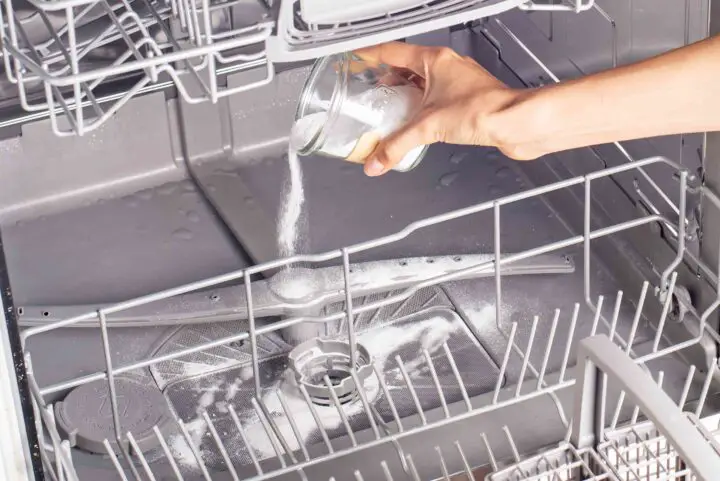
If the dishwasher cannot keep your dishes clean, the holes in the sprayer arms are most likely clogged. Take a cloth and dunk it in white vinegar before wiping the arms. Don’t stop there. Wipe everything you see. Scrub all the cloudy and spotty sections. Keep an eye out for rusted parts. The volume of the vinegar matters as well.
Also, note that vinegar has acidic properties. Excess quantities can do more harm than good. Don’t use vinegar to wash the dishwasher every day, so wait a week or a month.
3). Vinegar + Baking Soda
Put a bowl of vinegar in the dishwasher and run the appliance. Wait until the cycle is complete before sprinkling a layer of baking soda on the bottom. Rerun the appliance.
The objective is to reach every corner that could be vulnerable to hard water deposits. Don’t use the dishwasher immediately after. Instead, give it a few hours. Keep the dishwasher open during this period. Wait until the odors have dissipated.
4). Rinse Aid
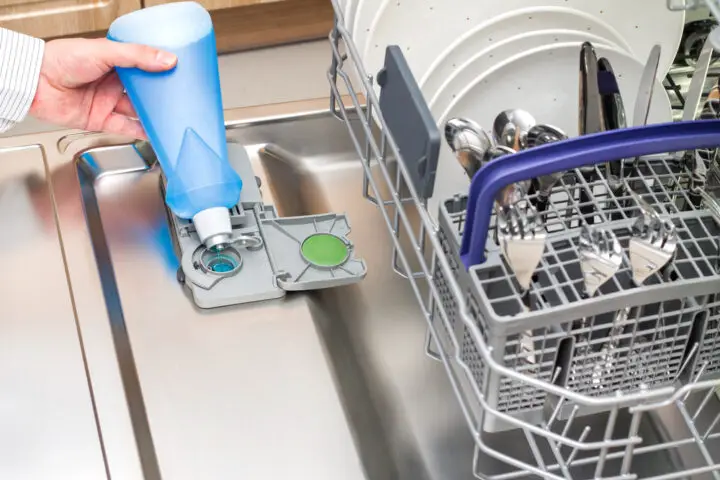
Have you heard of rinse aid? Once you load it, the commercial product will prevent hard water residue from clogging the dishwasher or forming spots on your dishes. Rinse aid (and other products that perform the same function) is quite common in regions where the water is hard.
5). Water Softener
If the water in your region has a higher mineral content than usual, a water softener can solve this problem by removing the minerals. Thus, water softeners eliminate the need for frequent scrubbing.
6). Hot Water
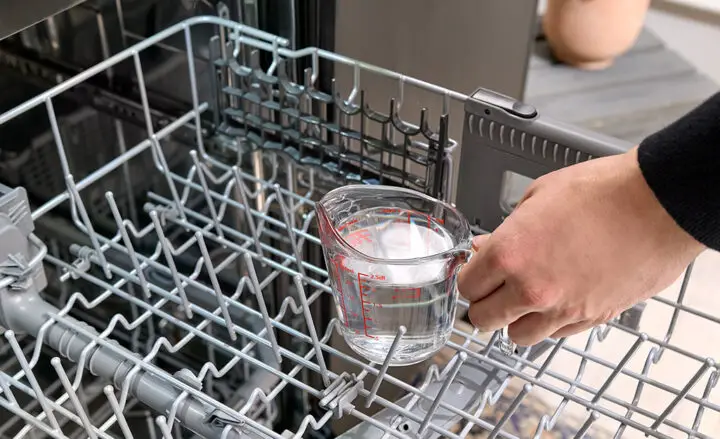
Hot water can dissolve the minerals that have coated the dishwasher. Run an empty dishwasher and use the most scalding water if possible. Hence, It will make descaling easier.
7). Sprayer Arms
You don’t have to give your dishwasher a thorough cleaning whenever its efficiency deteriorates. Use a safety pin to poke holes in the sprayer arms. You cannot trust dishwashers with clogged sprayer arms to clean your dishes
8). Detergent
Soap is less likely to form suds in hard water. Hard water makes ordinary detergents less effective. The most obvious answer is to use ordinary detergent in higher quantities. But it is more cost-effective to buy hard water detergent.
Some detergents have properties that enable them to work in hard water. Hard water detergents will keep your dishes clean regardless of the high mineral content.
9). Professional Help
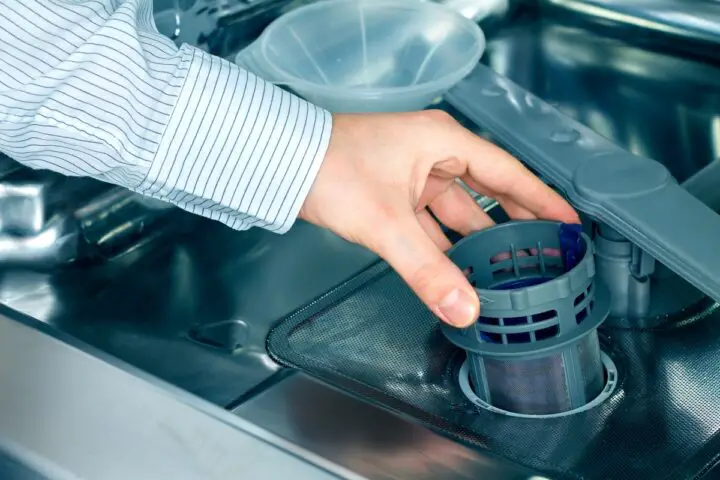
If you’ve done all you can, but your dishwasher is still deteriorating under the strain of chalky spots and scales, then call a professional. Though, you cannot fail to find an effective answer out of all the options outlined above.
Before you surrender, go and buy some water softeners in Phoenix from americanhomewater.com. They are the most reliable. But if you don’t have the money to invest in a water softener, a professional will identify a cheaper and more practical solution.
Clearly, people whose dishwashers have started malfunctioning because of hard water buildup have numerous solutions at their disposal. Start experimenting. Don’t stop until all the hard water scales are gone.

